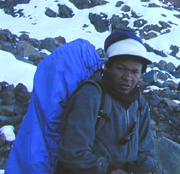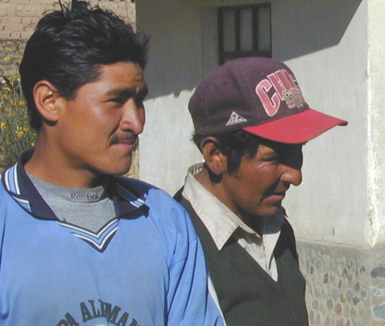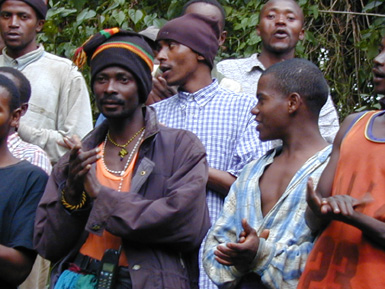"Trekking" seems to be a cultural form developed in the 19th century British empire. The Wikipedia associates it with mountainous regions of Nepal and India, but clearly it has spread worldwide. A trek involves local guides and a swarm of cooks, campsite workers, animal handlers and/or human porters who make it relatively comfortable for tourists to explore remote areas and heights they'd find difficult to reach on their own. For many tourists, trekking is easy adventure. All you have to do is keep yourself moving; the trekking company and its hired leaders will supply meals, tents and sometimes gear. In any case, somebody else will carry what you need.
A day of trekking will probably run something like this, from the tourist perspective:
6:30 am: wake-up in your tent to an offer of tea (those Brit origins here) or coffee and a bowl of hot water to wash in.
7:15 am: pack your sleeping bag and personal gear up for the porters. Tent crewmen will take down your tent, while you have breakfast in the mess tent.
8:15 am: start walking, climbing, whatever you are doing that day.
12 noon: porters have passed you on the trail with gear and tents; cooking crew has rushed ahead, and now you arrive at the newly erected mess tent for lunch.
1:00 pm: Walk some more.
4:00 pm: reach fully set up camp; find your personal gear in the pile and spread it out in your tent.
4:30 pm: Tea (more Brit origins here -- trekking leaders like to keep you full of carbs for energy and liquids to stay hydrated at altitude.)
5:00 pm: free time -- perhaps a little nap?
6:30 pm: dinner in the mess tent
7:30 pm: it is dark; perhaps it is time to go to sleep?
Repeat in the morning. Obviously, not a bad life if you can get it.


Guide Fredrick Chikima on Kilimanjaro; Guide Javier Bello in the Peruvian Andes
Good trekking guides are solid citizens with standing in their profession. (Of course there are bad, fly-by-night trekking companies and guides, but I've been lucky enough not to meet them.) The job requires long experience and some charisma; they not only have to jolly the tourists along, they also have to manage assistant guides, camp workers and porters, all of whom are likely to be casual contractors.

Peruvian crew men
Those jobs, lower in the strict trekking hierarchy, can be pretty good employment in poor societies. The combination of wages and tips can be a good income for rural men, perhaps supplementing farming in the off-season. But historically, porters have often been drawn from minority or undeveloped rural communities and exploited by both crew chiefs and the trekking companies. Inexperienced porters often lack mountain-ready clothing and equipment. A particularly pernicious practice is "paying off" a porter who develops altitude sickness and can't work; this can be a death sentence if the porter cannot find his way to lower altitude quickly.

Tanzanian porters
Fortunately in the main trekking countries, Nepal, Tanzania and Peru, porters have organized associations or unions to keep wages up and gain some control over working conditions. The International Porter Protection Group (IPPG) tracks these efforts and provides technical assistance. They provide a list of questions to ask any company you deal with before you sign up for a trek:
1. Does the company you intend to trek with endorse the IPPG's guidelines on porter safety: are adequate clothing and shelter, insurance and provision for evacuation of porters provided?
2. What is their policy on equipment and health care for porters?
3. What do they do to ensure the trekking staff is properly trained to look after porters' welfare?
4. What is their policy on training and monitoring porter care by its ground operator in the country you will visit?
5. Do they ask about treatment of porters in their post trek questionnaire to clients?
To these questions, I can add a few others :
1. Does the company have a commitment to the country you will visit, for example employing permanent staff who are citizens there?
2. Does the company seem in touch with and respectful of the culture(s) of the place you hope to visit, for example promising to educate the visitor about it?
3. Does the company have policies that help preserve the environment from the damage that intensive tourism can cause: overuse, excess waste, pollution?
The two trekking companies I've taken trips with have met these criteria admirably: Thomson Safaris in Tanzania and World Expeditions, an Australian company with exceptionally good relations with responsible local touring companies in many areas of he world.
No comments:
Post a Comment